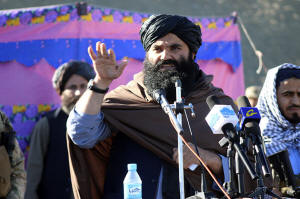The US lifts bounties on senior Taliban officials, including Sirajuddin
Haqqani, says Kabul
[March 24, 2025]
By The Associated Press
The U.S. has lifted bounties on three senior Taliban figures, including
the interior minister who also heads a powerful network blamed for
bloody attacks against Afghanistan’s former Western-backed government,
officials in Kabul said Sunday.
Sirajuddin Haqqani, who acknowledged planning a January 2008 attack on
the Serena Hotel in Kabul, which killed six people, including U.S.
citizen Thor David Hesla, no longer appears on the State Department’s
Rewards for Justice website. The FBI website on Sunday still featured a
wanted poster for him.
Interior Ministry spokesman Abdul Mateen Qani said the U.S. government
had revoked the bounties placed on Haqqani, Abdul Aziz Haqqani, and
Yahya Haqqani.
“These three individuals are two brothers and one paternal cousin,” Qani
told The Associated Press.
The Haqqani network grew into one of the deadliest arms of the Taliban
after the U.S.-led 2001 invasion of Afghanistan. The group employed
roadside bombs, suicide bombings and other attacks, including on the
Indian and U.S. embassies, the Afghan presidency, and other major
targets. They also have been linked to extortion, kidnapping and other
criminal activity.
A Foreign Ministry official, Zakir Jalaly, said the Taliban’s release of
U.S. prisoner George Glezmann on Friday and the removal of bounties
showed both sides were “moving beyond the effects of the wartime phase
and taking constructive steps to pave the way for progress” in bilateral
relations.
“The recent developments in Afghanistan-U.S. relations are a good
example of the pragmatic and realistic engagement between the two
governments,” said Jalaly.
Taliban see the opening in breaking out of isolation
Another official, Shafi Azam, hailed the development as the beginning of
normalization, also citing the Taliban’s announcement they were in
control of Afghanistan’s embassy in Norway.
Since the Taliban takeover of Afghanistan in August 2021, China has been
the most prominent country to accept one of their diplomats. Other
countries have accepted de facto Taliban representatives, like Qatar,
which has been a key mediator between the U.S. and the Taliban. U.S.
envoys have also met the Taliban.
The Taliban rule, especially bans affecting women and girls, has
triggered widespread condemnation and deepened their international
isolation.
[to top of second column]
|

Acting interior minister Sirajuddin Haqqani, speaks during the
funeral prayers of Khalil Haqqani, the minister for refugees and
repatriation, during his funeral procession in eastern Paktia
province, Afghanistan, Dec. 12, 2024. (AP Photo/Saifullah Zahir,
File)
Haqqani has previously spoken out against the Taliban’s
decision-making process, authoritarianism and alienation of the
Afghan population.
He has been under U.N. sanctions since 2007, because of his
involvement with the network founded by his father, Jalaluddin.
But the global body has allowed him to travel in the past 12 months,
including to the United Arab Emirates to meet the country’s
leadership and to Saudi Arabia for pilgrimage. Those were his first
trips abroad since the Taliban takeover.
Ibraheem Bahiss, a senior analyst with International Crisis Group’s
Asia program, said the removal of the bounties was a win for Taliban
officials wanting to do business with the international community.
The U.S. was showing it could reward those who made compromises
within their own remit, even if these compromises didn’t translate
to national policy, he said.
The international community had made demands of the Taliban,
specifically lifting restrictions on women and girls, but offered
nothing in return, said Bahiss. Scrapping bounties was a sign that
small diplomatic overtures were possible.
While recognition as the legitimate rulers of Afghanistan might not
immediately be on the horizon, the Taliban viewed normalization as
enough progress given their existing diplomatic inroads in the
region, according to Bahiss.
“For the Taliban, the removal of sanctions is more important than
(official) recognition. Sanctions bite. They inhibit your ability to
do business, to travel. That’s why they would celebrate this as a
victory. The transactional nature of this diplomacy suits both the
Taliban and Trump.”
His partial rehabilitation on the international stage is in contrast
to the status of the reclusive Taliban leader Hibatullah Akhundzada,
who could face arrest by the International Criminal Court for his
persecution of women.
All contents © copyright 2025 Associated Press. All rights reserved |